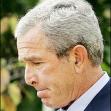DOJ LAWYERS REFUSED TO AUTHORIZE TORTURE, NSA DOMESTIC SPYING

Behind the scenes of the Justice Department, a few courageous lawyers dedicated to the rule of law pushed back against the "torture memo" and authorization of illegal NSA domestic wiretapping. Newsweek has the remarkable story.
So much for Dubya's insistence that DOJ lawyers vetted and approved his actions.
For nine months, from October 2003 to June 2004, he had been the central figure in a secret but intense rebellion of a small coterie of Bush administration lawyers. Their insurrection, described to NEWSWEEK by current and former administration officials who did not wish to be identified discussing confidential deliberations, is one of the most significant and intriguing untold stories of the war on terror.
These Justice Department lawyers, backed by their intrepid boss Comey, had stood up to the hard-liners, centered in the office of the vice president, who wanted to give the president virtually unlimited powers in the war on terror. Demanding that the White House stop using what they saw as farfetched rationales for riding rough-shod over the law and the Constitution, Goldsmith and the others fought to bring government spying and interrogation methods within the law. They did so at their peril; ostracized, some were denied promotions, while others left for more comfortable climes in private law firms and academia. Some went so far as to line up private lawyers in 2004, anticipating that the president's eavesdropping program would draw scrutiny from Congress, if not prosecutors. These government attorneys did not always succeed, but their efforts went a long way toward vindicating the principle of a nation of laws and not men.
...
Goldsmith raised with Comey serious questions about the secret eavesdropping program, according to two sources familiar with the episode. He was joined by a former OLC lawyer, Patrick Philbin, who had become national-security aide to the deputy attorney general. Comey backed them up. The White House was told: no reauthorization.
...
By June 2004, the crisis came to a head when the torture memo leaked to The Washington Post. Goldsmith was worn out but still resolute. He told Ashcroft that he was formally withdrawing the August 2002 torture memo. With some prodding from Comey, Ashcroft again backed his DOJ lawyers—though he was not happy to engage in another battle with the White House. Comey, with Goldsmith and Philbin at his side, held a not-for-attribution background briefing to announce that the Justice Department was disavowing the August 2002 torture memo.
Tags: Bush, torture memo, illegal NSA spying





0 Comments:
Post a Comment
<< Home